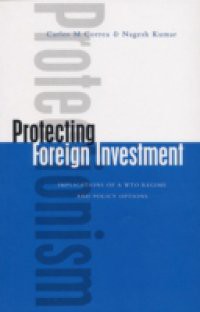This book examines one of the most important instances of this: the rich countries' insistence that the WTO not only launch a new round of world trade negotiations, but that rules which were supposed to be confined to trade issues now be extended by means of new agreements protecting foreign direct investment. The two authors of this book have an intimate knowledge of WTO negotiating processes. They explain in detail the North's relentless determination to give privileged protection to the overseas investments of its transnational corporations. These initiatives have included, inter alia, the OECD's failed MAI initiative, the World Bank-sponsored Multilateral Investment Guarantee Agency, and the WTO's General Agreement on Trade in Services (GATS) and Agreement on Trade-related Investment Measures (TRIMS). The authors spell out their consequences for developing countries. They examine whether there is any real case for a new multilateral framework on investment within the WTO. And they propose various options for developing countries to resist what amounts to a new form of Western protectionism, including how a development dimension could be incorporated in any new agreement, should the member countries of the WTO decide to proceed with negotiations.

